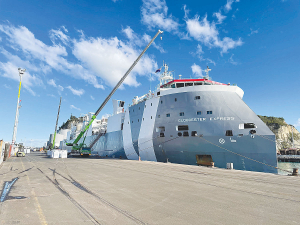High hopes for return of live exports
Livestock exporters are hoping to resume shipping animals from August next year.
 Animal Genetics Trade Association chairman Mark Willis is worried about the long-term impacts of a ban on livestock exports.
Animal Genetics Trade Association chairman Mark Willis is worried about the long-term impacts of a ban on livestock exports.
A website has been set up to fight the Government's plan to phase out livestock exports from 2023.
In their fight to keep the trade going, the Animal Genetics Trade Association (AGTA) have built the website - www.livestockexports.nz - to build awareness and understanding of exporting livestock from New Zealand.
It showcases why exporting livestock is important, the extent of the supply chain involved and helps address animal welfare concerns. The website also facilitates submissions agains the bill.
"We need to look at this from a global perspective, we can't just look at this from inside New Zealand," says the technical advisor to AGTA, Dr Jim Edwards.
"The level of urbanisation around the world is affecting food security, and we are in a position where we can and should help."
AGTA says it represents the interests of the livestock export and germplasm industries and the chair Mark Willis is worried about the long-term impacts of the ban.
"We know they will extend across farmers and throughout the supply chain and have potential trade ramifications, but the full impacts are not fully understood yet," Willis says.
"Trade relationships have been built from livestock exporting. We watched the sales of New Zealand whole milk powder grow exponentially since the start of livestock exports to China.
"It's concerning that those customers could start forming relationships with other countries to obtain cattle for their domestic farming operations, and if that evolves into other relationships and they buy products from those countries instead of New Zealand, where are we going to sell our milk powder?"
In 2020, New Zealand exported $255.89 million of live cattle to the rest of the world. Additional to the livestock value that farmers receive directly, a shipment of around 3000 animals can return roughly $1.5 million to New Zealand based service providers. It's the rural areas and rural service centres that see most of the economic benefits from the trade.
But claims surrounding animal welfare during the voyage on the ships was the Government's reason for the ban.
AGTA says this is despite two independent reviews into the trade concluding that it should continue with some modifications.
"The website is one tool we have to address concern and help more people understand what livestock exporting is all about; it's a valuable trade and it will be hugely disappointing if the ban does come into effect," Willis says.
Find our more at www.livestockexports.nz
According to the latest Fresh Produce Trend Report from United Fresh, 2026 will be a year where fruit and vegetables are shaped by cost pressures, rapid digital adoption, and a renewed focus on wellbeing at home.
The Roar is a highlight of the game hunting calendar in New Zealand, with thousands of hunters set to head for the hills to hunt male stags during March and April.
OPINION: The past few weeks have been tough on farms across the North Island: floods and storms have caused damage and disruption to families and businesses.
European dairy giant Arla Foods celebrated its 25th anniversary as a cross-border, farmer-owned co-operative with a solid half-year result.
The sale of Fonterra’s global consumer and related businesses is expected to be completed within two months.
Fonterra is boosting its butter production capacity to meet growing demand.
OPINION: Fonterra may be on the verge of selling its consumer business in New Zealand, but the co-operative is not…
OPINION: What does the birth rate in China have to do with stock trading? Just ask a2 Milk Company.